Compulsion
There is something about real killers that makes them great material for film adaptations, whether it is Ed Gein for Psycho, The Texas Chain Saw Massacre and The Silence of the Lambs, Charles Starkweather and Carol Fugate for Badlands and Natural Born Killers or Nathan Loeb and Richard Leopold in Rope and Compulsion. In 1924, homosexual law students Loeb and Leopold, obsessed by Nietzsche's theory of the Superman and the Super Intellect, demonstrated that they were so superior that the murdered a 14-year-old boy, Bobby Franks, just because they could and because it would be a perfect demonstration of their intellectual superiority.
Although it doesn't say so, the film is clearly based on the Loeb and Leopold murder, with Loeb renamed as Artie Straus and Leopold renamed Judd Steiner. The film begins with Artie giving Judd a lift home, having robbed a rival fraternity house, when they come across a drunk in the middle of the road, gesticulating and shouting at them. Artie is about to run the man down when Judd grabs the steering wheel, moving the car out of the way at the last minute and, when he refuses to commit vehicular murder when he is at the wheel and Artie dares him to, they come to an agreement that they will find a way to demonstrate their intellectual superiority but only if there is no chance of them being caught.
Following a few scenes set in the University or in Artie's house, there is the announcement that a local boy, Paulie Kessler, who went missing has been found dead and one of Artie and Judd's friends Sid Brooks, another student and part-time reporter, helps identify a body in the town's morgue and discovers that the glasses found with a body don't belong to him so are possibly a vital clue in finding the murderer.
With the two students assisting the police, particularly Judd, they know exactly what the police do and Judd is able to reassure Artie that the glasses he lost at the murder scene one of over 4000 similar pairs in Chicago so the police will be unable to track them down to him. All Artie needs to do, however, is come up with a reason why he doesn't have his glasses and a possible explanation as to why they would be found in the vicinity of the body.
It isn't long before the police end up thinking of Artie and Judd more than just inquisitive law students and as possible suspects and, although they have concocted a seemingly watertight alibi, are not exactly sure whether it will stand up to close scrutiny by District Attorney Horn. The film isn't so much about the investigation although this does take up at least half an hour but is all about the trial when the two arrogant murderers are represented by celebrated defence attorney Jonathan Wilk who doesn't so much as defend his two clients as put the entire legal system and death penalty on trial.
This is one of those films (like The Third Man) in which Orson Welles gets top billing for a minority of the screen time. The bulk of the film concentrates on the two students who are chillingly played by Dean Stockwell (as Judd) and Bradford Dillman (as Artie), really coming across as completely unsympathetic, arrogant and with an utter disregard for human life. When Orson Welles appears, with less than 35 minutes left in the film, it is clear why he gets top billing as he is such a formidable screen presence playing the crumpled, laconic and sarcastic lawyer who reacts flippantly to the KKK burning a cross in front of his guesthouse and delivers an absolutely engrossing speech to the public and, in particular, the judge who will have ultimate say on whether his clients live or die.
This final scene is extremely powerful, suspenseful and tense with Welles commanding centre stage with you hanging on every word. It helps that he was provided with a brilliant script by Richard Murphy which apparently takes the dialogue from Meyer Levin's book almost verbatim and with very few changes. The direction and editing by Richard Fleischer and William Reynolds makes this courtroom scene as taut as any other in history of cinema and the final exchange between Wilk and Artie is one of the most interesting lines in the entire film.
The Disc
The Picture
By and large, the monochrome picture is extremely crisp with decent contrast levels although there are some odd moments when it cuts from one angle to another to reveal that some of the film has a slightly green tint. This doesn't detract from the overall viewing experience, which is utterly engrossing and superbly acted.
The period detail is fairly sparse, limited to two cars and costuming. All of the set decoration really looks as if it was based on photographs from 1924 and so helps to maintain the illusion that it is set at the time.
The Sound
The Dolby digital 2.0 Mono soundtrack is mostly clear with well presented dialogue but there are a few moments in the courtroom scene when the odd line or word will be a little bit muddy and not as crisp as the rest of the film but whether this is due to Orson Welles, the sound recording or its transfer onto DVD is open to debate.
Final Thoughts
It is a slight shame that there are absolutely no extra features but, given the age of the film and how many of the cast and crew are still alive, it's hard to imagine what sort of special features they could include; perhaps a trailer?
That being said, Compulsion is a tremendous film that anyone with an interest in great films, crime thrillers and courtroom dramas would be well advised to rent or buy.
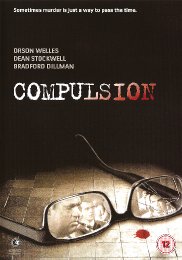
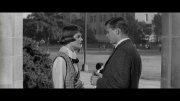
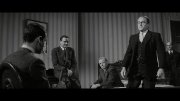
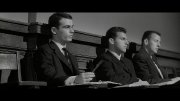
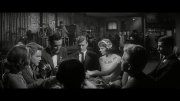
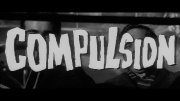
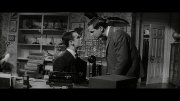
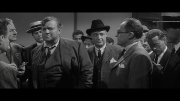
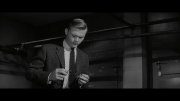
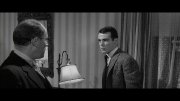
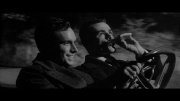
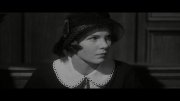
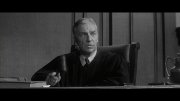
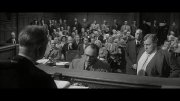
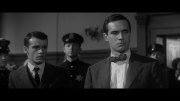
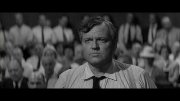
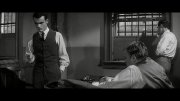






































Your Opinions and Comments
Be the first to post a comment!